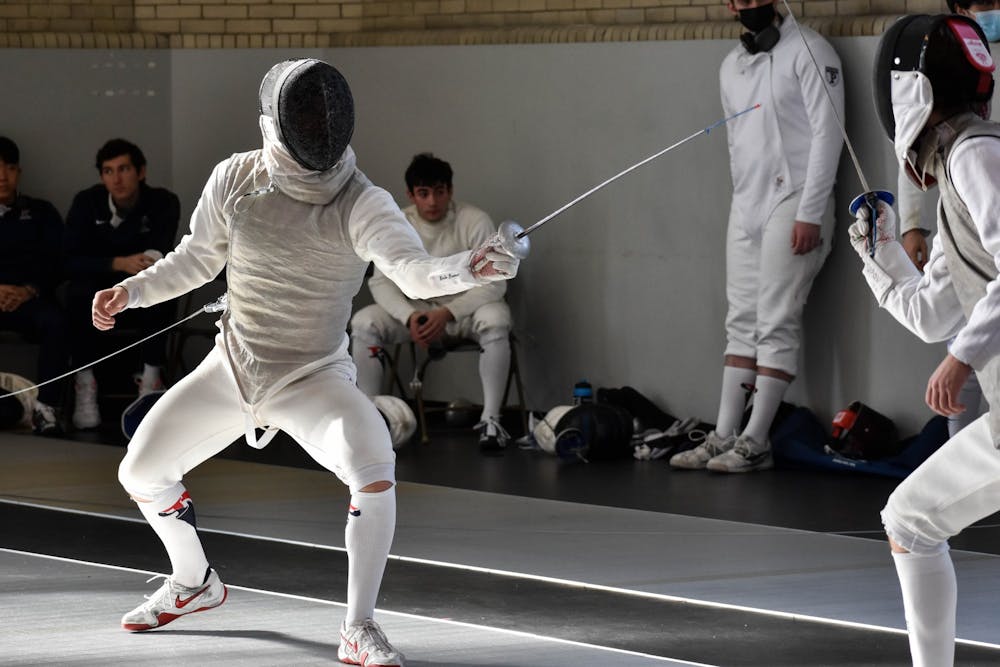They say not to meet your heroes, but nobody ever said anything about fencing them.
Blake Broszus, a junior at Penn and captain of the fencing team, first discovered the sport during the 2008 Summer Olympics through commercials he saw during other events. Particularly catching his attention was the German Benjamin Kleibrink, a left-handed foil fencer who won the gold medal that year.
“Some people get into it because of the Pirates of the Caribbean or whatever, but I just thought the sport looked cool,” Broszus said. “But I’ve watched [Kleibrink’s] match 100 times. I love his game.”
As fate would have it, Broszus — a fellow left-handed foil fencer — faced off against his hero in the 2020 Olympic Games well over a decade later. But there was much that would unfold in between.
Before his parents agreed to sign him up for a fencing lesson, Broszus scoured through any books and film on the sport that he had come to love. Eventually, his father became a great driving force in his fencing career, and Broszus chose to represent the Canadian National Team in the Olympics. Despite spending most of his childhood in California, his father's heritage from The Great White North granted Broszus dual citizenship.
Before competing in the Olympics, though, Broszus first arrived at Penn in the fall of 2020 as a freshman. However, due to the COVID-19 lockdowns, he didn’t stay for long.
He did become fast friends with fellow Californian Bryce Louie, the foil fencer who finished second-team All-Ivy last season. Louie recounts the two fencing each other in their dorm room hallways and running up the Rocky Steps to stay in shape as all of the facilities were shut down.
Three weeks into the semester, Broszus realized he would need to train more seriously to have a shot at making the Olympic team. He returned home to California and took a gap year to prepare.
But even in that short time at Penn, Louie noticed an immense talent in Broszus as a teammate.
“Blake is one of the best left-handed fencers in the world,” Louie said. “He is extremely strong and very physical as a fencer.”
Fencing coach Andy Ma identified Broszus’s skills even earlier, noticing him at a fencing competition when he was just 12 years old.
“Very disciplined, the best, couldn’t be better,” Ma said.
Broszus stands a tough opponent to take down due to his physical strength, a result of extra hours spent in the weight room.
Louie recalled the first time he lifted with Broszus at Pottruck. When the latter started his first set, everyone else in the gym paused and stared, blown away at how much he could squat.
“It’s never a good idea to lift with Blake,” he said jokingly.

Combined with his great strength, Broszus is known to pull off impressive, acrobatic moves to corner his opponents. Perhaps even more important to his game is his preparation, as Blake dissects his opponents ahead of time to form match day strategies. He then spends hours watching the tape of the top fencers in the world to improve his own game.
As a team captain, Broszus helps implement a practice routine for his entire team. He is known to be willing to make time to fence anyone outside of practice to help them improve.
“He’s very charismatic, very energetic, humble, and he’s a team-oriented leader,” Louie said.
“He’s a good fencer, no question,” Ma said. “But I would say he’s also one of the best human beings. He doesn’t just focus on himself, but on the whole team.”
With all his remarkable talent and demeanor at just 20 years old, Broszus was unable to topple his hero Kleibrink in the Olympics last summer, falling 5-3 in a pivotal match.
Broszus still enjoyed the Games as an opportunity to learn and meet some interesting people at the Olympic Village. He recalls walking around one morning seeing speed walkers power through the facility, and then soon later passing by NBA superstar Luka Doncic on his next turn.
“You have some athletes who are short, stocky, balls of muscle, and then you have the seven-foot volleyball players lumbering around,” Broszus said. “Everyone was so different, but at the same time everyone in there was a very intense, top-notch athlete.”
Broszus has his eyes set on the 2024 Paris Games, with a goal to win a medal. He plans to take another gap year, and expects his routine to be quite monotonous and intense. He is still enthusiastic for the challenge.
“There’s something about having that very intense focus and knowing what you need to do to succeed,” Broszus said. "There’s some sort of cool clarity about it.”
After the Olympics, Broszus intends to return to Penn to finish his collegiate fencing career, but what happens after that is still undecided. He is concentrating in statistics at Wharton and is aiming for a related career, potentially in quantitative trading or biotech.
Ma is certainly excited that one of his top fencers will be returning, but he is also enthusiastic about his prospects in Paris.
“Two years ago for Tokyo he was young, but now he’s much more mature,” Ma said. “I think he will have a good chance.”
Whether Broszus will get another shot at taking down Kleibrink is yet to be seen, but it’s safe to say that Broszus will be alright with beating anyone as long as it leads him to the podium.









